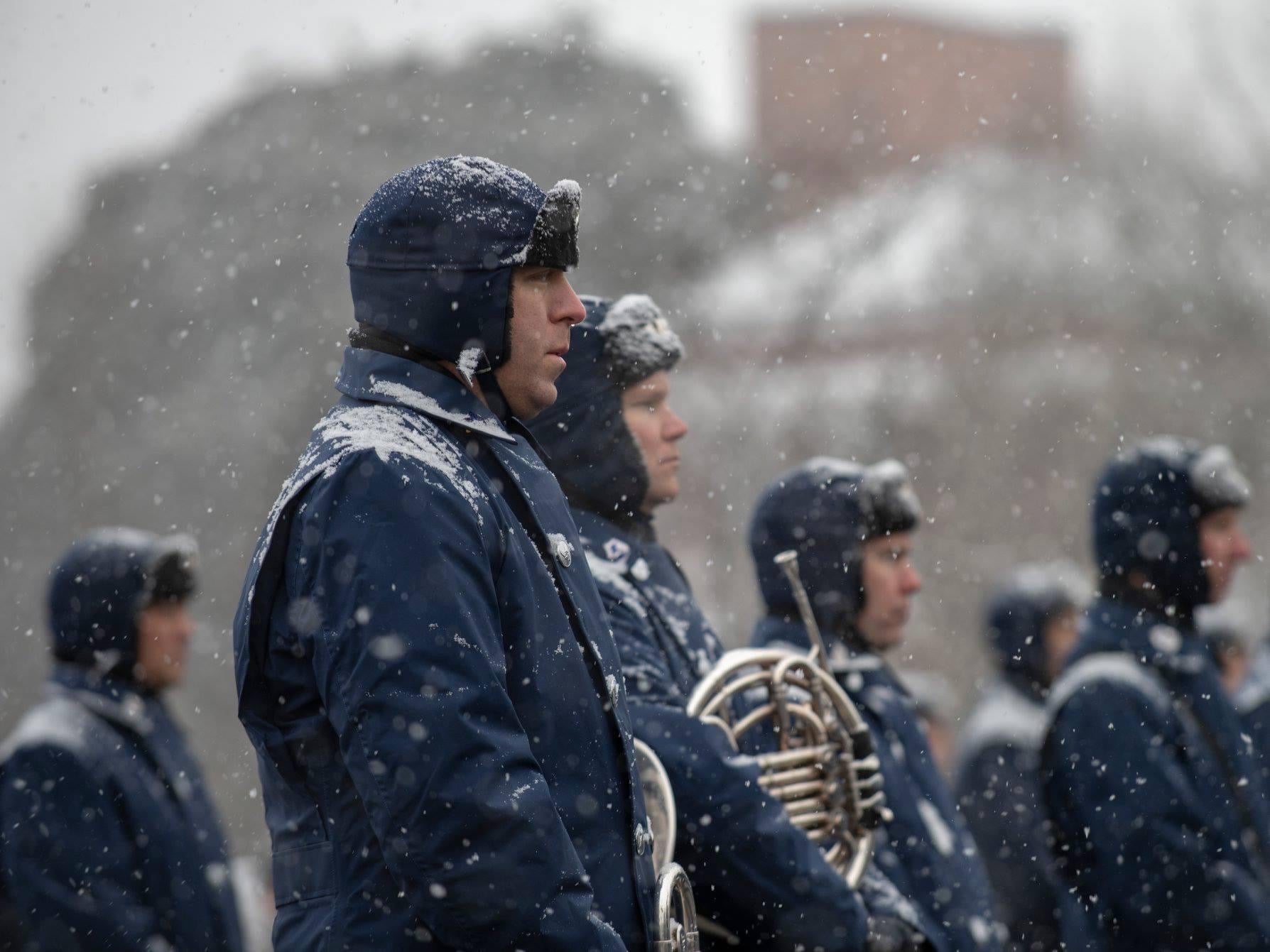Going through the Air Force’s Basic Military Training as a 34-year-old is an odd experience, according to trombonist Andrew Reich. You’ve lived life on your own. You’ve had a career. You could be married. You might even have kids.
But you’re sleeping in bunks between 18-year-olds, most of whom have never lived outside of their parents’ house before. Many of them have never paid taxes, voted, or even drunk a beer (legally, at least).
But in the eyes of the U.S. Air Force (USAF), even at 34, you’re no different than these kids. You’re all just fresh-faced Airmen, beginning a new career.
“A lot of these guys I was in Basic with just graduated high school,” Reich said, laughing. “Their parents dropped them off that morning. I mean… I could’ve been their dad!”
For him, that was the strangest part of the whole experience. It wasn’t the pushups or the screaming drill sergeants or the scrubbing floors with a toothbrush or the bugles in the morning.
But like every other path his musical career has led him down, Reich embraced it with open arms. Today, he couldn’t be happier.
Like many members of the Coregami family, the trombonist is a lifelong musician. “I’ve been into music as far back as I can remember,” Reich said. The 38-year-old has been playing for his entire life. He’s played concerts everywhere from South Korea to Italy to Bulgaria.
These days, of course, he’s not just any trombonist. A Technical Sergeant in the USAF, Reich performs as a member of the prestigious Ceremonial Brass, the outfit that plays military funerals at Arlington National Cemetery.

USAF Technical Sergeant Andrew Reich
Playing funerals is no light-hearted gig. It’s even tougher when you’re playing in frigid rain, heavy snow, high wind, and all other manners of inclement weather imaginable.
But for Reich, it’s a dream gig, and he wouldn’t change a thing. “You’re honoring people that have given a life of service to the flag and the country. I respect that tremendously. I’m grateful and blessed to be a part of it.”
Following the Music
Born and raised in Columbia, South Carolina (“to two Yankee parents from Long Island”), Reich grew up in a musical family. “We had pianos and other instruments in the house, my dad was an amateur trumpet player, he’d play taps at firefighter funerals,” he said.
His older brother took piano lessons at a young age, and Reich was always at the end of the piano looking on in envy. By middle school, he was playing the trombone himself. “Music just always appealed to me,” he said. “The camaraderie, playing with friends… As a kid, I was obsessed with reading music. I would find anything with music notes and I’d pick it up and read it and want to hear what it sounded like.”
“I had a pretty diverse taste in music,” he added. “I grew up with my dad's records. We had classical, we had trumpet albums, stuff like Al Hirt, Doc Severinsen, Walter Murphy’s A Fifth of Beethoven.”
Reich went on to play music in high school, and though he was torn between baseball and marching band, he eventually realized that “to really excel, I couldn’t devote enough time to both be in the batting cages and be the best hitter on the team but also practice long tones and lip slurs and make first chair All-State.”
Staunchly competitive, he made a call, picking music over sports, and then went full-steam.
Later in high school, while taking lessons from a trombone professor at the University of South Carolina, Reich learned he might be able to attend college there on scholarship, which he did, graduating with a Bachelor of Music degree in trombone performance in 2005.
From there, he just kept charging down the performance path, earning a Master of Music in trombone performance from UGA in 2007.
“I never got an education degree. For me, it was performing or bust,” he said, laughing. “I never had the patience to be in a middle school or high school band room.” Though he applied to other schools further afield and dreamed of “getting up to New York, right by the action in Lincoln Center,” staying in the South for grad school just made the most sense.

“I’m a cheapo, man,” he joked. “I follow the money, and I’m OK with that.”
He moved back to Columbia after grad school, plugged back into the music scene, and began performing and teaching to fund his way. “Anything within four hours, I’d say yes. Anything over that, I’d consider it. Every dime I made back then went into my audition fund.”
Reich flew everywhere, applying for any vacancy that popped up. It didn’t take long.
After a year, he landed a job with Tim Zimmerman and the King’s Brass, a Christian nine-piece group that travels the country playing churches and other religious events, traveling with them 20 weeks out of the year. “We’d do two-hour concerts, fully memorized, full choreography,” he said of the gig, which he recalled fondly.

After seven years with the King’s Brass, during which he was still constantly auditioning for new gigs, he landed a role with the USAF’s Ceremonial Brass, in 2017.
As mentioned above, as a musician in his 30s, he stuck out like a sore thumb going through basic training. He was over a decade older than most of the recruits. But that wasn’t uncommon, for a military musician. “Most musicians who land one of these military jobs have a lot of life experience already, just because of how competitive they are,” he said. “But I tried to embrace [the age gap]. Show up on time. Shave. Look, if they don’t know my name after eight weeks, I did a good job,” he said, chuckling.
But whether it was playing in a Christian band or joining the military, regardless of the discomfort or oddity of the experience, Reich followed the music and whatever doors it opened for him.
Excellence in All We Do
Today, he lives in Arlington, Virginia, with his wife, a former flutist. And though he calls his gig playing with the Air Force “the ideal situation,” at first it sounds like the exact opposite.
For starters, that’s because the playing conditions are often heinous. “Very rarely am I sitting down in a chair, with a stand,” he said. “I’m reading flip folder music attached to my slide, and I’m outside, and it’s windy, or raining, or snowing.” Funerals happen 50 weeks out of the year at Arlington National Cemetery, with the only shutdown occurring at Christmas.
“We’ve been out there with heat indexes of 110℉ with lighting coming over the hill, rainstorms coming…” he continued. “One of my first funerals, the wind chill was 9℉, snowing sideways… Sometimes you have to march over a mile and a half to get to a gravesite. You’re wearing a uniform too, usually dress shoes or boots. You’re not wearing Nikes. It’s difficult.”

Coregami helps Reich and his fellow Ceremonial Brass players in numerous ways, but the comfort of Coregami apparel, in particular, pays dividends for him. “I’ve ordered a ton of those Bernstein shirts,” Reich said. “Having the Coregami developments of breathable fabric, stretch fits, antimicrobial… When you go on a concert tour for two or three weeks you don’t have access to dry cleaning. Usually, your shirts can get pretty sour, and Coregami technology changes that.”
But Coregami can’t help with everything. That’s because Reich’s work isn’t just physically taxing. It’s emotionally heavy, too.
“When I first got in, I didn't want to desensitize myself to what I’m doing, playing these funerals,” he said. “But you don’t know the family, it’s not as personal as you might think. You’re separated from a lot of the emotion.” In his first year, he played over 200 funerals, and he’s played around 500 total in the almost three years since. By the time he finishes his military career, he estimates he’ll play well over 2,000.
But though each funeral follows a similar structure, they all differ dramatically.
Some are active duty deaths, with plenty of family and friends attending. Others happen when a foreign nation, like Korea or Vietnam, will find the remains of a body and send it home. These are deaths that may have happened in 1960, but the fallen get an active duty funeral over 60 years later. In these cases, there often aren’t many family and friends left, if any at all.
“I played one yesterday… and it really got to me,” Reich said when we spoke.
“There was just one little car coming up, and just one little old lady got out. She was the only one there. When we were marching away I saw her holding the flag they had just presented to her… All alone. I really felt for her.”
That’s a large part of why Reich’s work is so meaningful. Even when the fallen don’t have many (or any) loved ones to remember them, he and his bandmates are there to honor them regardless, rain or shine.
But for him, the work is impactful even beyond the honor of serving one’s country and the fallen.
“There are a lot of shared values between being a professional musician and being in the military,” he said. “One of the Air Force’s core values is ‘Excellence in All We Do.’ As a professional musician, I think that’s our top value, too. If you’re not giving it 100% as a pro musician, you’re not going to be very successful, either.”
It’s not an easy gig, but Reich enjoys it. He noted that he has no intention of returning to the civilian sector. “I’m very happy,” he added. “For me, [this role] is the ideal situation,” he said. “I will get my retirement and pension if my body can hang in there for 20 years,” he added, laughing.
Yet despite Reich’s claims, there is at least one gig out there that might see him leave the USAF behind…
His music tastes today still revolve around horn bands, from Blood, Sweat & Tears to Earth, Wind & Fire. But his all-time favorite band, “and this does not change… is Chicago,” Reich said.
“If they’re anywhere close, I go see ‘em. I always yell at the trombone player [James Pankow], ‘When are you retiring? I’m ready to take over!’”
He paused, then chuckled and added, “But he’ll never die.”






